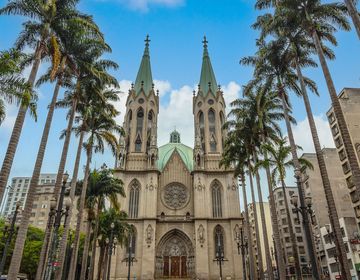
Diversity in São Paulo
CIEE wants all our students to feel welcomed, supported, and empowered to succeed while studying abroad. On this page, local CIEE staff have provided details about conditions and cultural attitudes that students with specific identities might encounter at their location.
The information below is just a broad overview so if you have specific questions or concerns not covered here, please email inclusion@ciee.org. We would be glad to have local staff share their perspectives, talk with you about accommodations, connect you with resources, and/or put you in touch with a program alum who could speak about their experiences navigating a program in this location.
No matter where you choose to study abroad with CIEE, our staff—all of whom receive regular and comprehensive training in diversity, equity, and inclusion—will be on hand throughout your program to provide advice, resources, and support regarding these issues.
Body Size/Image
In Brazil, beauty standards are strongly influenced by media portrayals, with an emphasis on thinness, fitness, and cosmetic enhancements. However, body positivity movements are gaining traction. In São Paulo, a diverse and cosmopolitan city, body image perspectives vary widely depending on social class and cultural background.
Disability
Public accessibility in São Paulo is improving but still presents challenges. Sidewalks may be uneven, and public transportation options, while increasingly incorporating accessibility features, can still be difficult for individuals with disabilities. Universities and workplaces are gradually adapting to be more inclusive, and students with disabilities should inform CIEE staff about specific needs prior to arrival to facilitate appropriate accommodations.
Gender and Gender Identity
While São Paulo is known for its LGBTQIA+ inclusivity – hosting one of the world’s largest Pride parades – gender expression can still be a point of discrimination. Individuals who challenge traditional gender norms may experience microaggressions or overt discrimination, particularly in more conservative social spaces. CIEE staff are available to support students and provide guidance regarding gender identity issues.
X Gender Marker
Brazil has made significant strides in LGBTQIA+ rights, including legalizing same-sex marriage. However, the recognition of non-binary and gender-nonconforming individuals remains limited. Most official documents do not yet offer an X gender marker, and individuals with such markers on their passports may need to provide additional explanations when dealing with bureaucratic processes.
Heritage Seekers
Brazilian society is generally welcoming to individuals exploring their Brazilian heritage. Many locals are eager to engage with students of Brazilian descent and discuss shared cultural ties. The country’s rich multicultural background makes it a fascinating destination for those looking to connect with their roots.
Racial and Ethnic Identity
Brazil is an ethnically diverse country with a history of colonization, African influence, and indigenous heritage. While racial pride and cultural fusion are celebrated, racial disparities persist in education, employment, and social mobility. Conversations about race are common, and students of African or indigenous descent may find strong cultural connections as well as discussions on race and identity.
Religion
Brazil is predominantly Catholic, but evangelical Protestantism has been growing rapidly. Religious diversity is respected, and students will find many different faith communities. Participation in religious festivals and events can offer valuable cultural insights, though students are never obligated to partake.
Sexual Orientation
São Paulo is one of the most LGBTQIA+-friendly cities in South America, but discrimination still exists, particularly in more conservative areas. While LGBTQIA+ rights are legally protected, societal attitudes can vary. CIEE staff are available to support students and ensure a safe and inclusive experience.
Socioeconomic Status
São Paulo is a city of stark contrasts, with wealth and poverty existing side by side. While students will find affordable food, entertainment, and cultural activities, they should also be aware of economic disparities and take safety precautions, especially in certain neighbourhoods.
Programs in São Paulo
